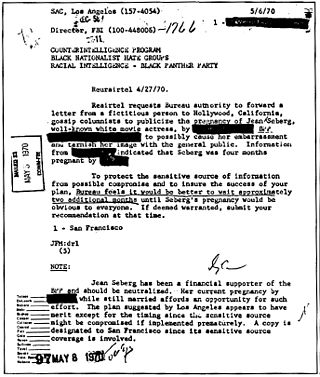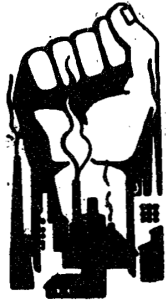
COINTELPRO was a series of covert and illegal projects actively conducted by the United States Federal Bureau of Investigation (FBI) aimed at surveilling, infiltrating, discrediting, and disrupting domestic American political organizations. FBI records show COINTELPRO resources targeted groups and individuals the FBI deemed subversive, including feminist organizations, the Communist Party USA, anti–Vietnam War organizers, activists of the civil rights and Black power movements, environmentalist and animal rights organizations, the American Indian Movement (AIM), Chicano and Mexican-American groups like the Brown Berets and the United Farm Workers, independence movements, a variety of organizations that were part of the broader New Left, and white supremacist groups such as the Ku Klux Klan and the far-right group National States' Rights Party.

Cold War espionage describes the intelligence gathering activities during the Cold War between the Western allies and the Eastern Bloc. Both relied on a wide variety of military and civilian agencies in this pursuit.

Lyndon Hermyle LaRouche Jr. was an American political activist who founded the LaRouche movement and its main organization, the National Caucus of Labor Committees (NCLC). He was a prominent conspiracy theorist and perennial presidential candidate. He began in far-left politics but in the 1970s moved to the far-right. His movement is sometimes described as, or likened to, a cult. Convicted of fraud, he served five years in prison from 1989 to 1994.
Western Goals Foundation was a private domestic intelligence agency active in the United States. It was founded in 1979 by Major General John K. Singlaub, the publisher and spy John H. Rees, and Congressman Larry McDonald. It went defunct in 1986 when the Tower Commission revealed it had been part of Oliver North's Iran–Contra funding network.
The National Caucus of Labor Committees (NCLC) is a political organization in the United States founded and controlled by political activist Lyndon LaRouche until his 2019 death. LaRouche sometimes described the NCLC as a "philosophical association". It is the main organization within the LaRouche movement. LaRouche was the association's leader, and the political views of the NCLC are virtually indistinguishable from those of LaRouche.

The U.S. Labor Party (USLP) was an American political party formed in 1973 by the National Caucus of Labor Committees (NCLC). It served as a vehicle for Lyndon LaRouche to run for President of the United States in 1976, but it also sponsored many candidates for local offices as well as congressional and Senate seats between 1972 and 1979. After that the political arm of the NCLC was the National Democratic Policy Committee. The party was the subject of a number of controversies and lawsuits during its short existence.

The LaRouche criminal trials in the mid-1980s stemmed from federal and state investigations into the activities of American political activist Lyndon LaRouche and members of his movement. They were charged with conspiring to commit fraud and soliciting loans they had no intention of repaying. LaRouche and his supporters disputed the charges, claiming the trials were politically motivated.

An informant is a person who provides privileged information, or information intended to be intimate, concealed, or secret, about a person or organization to an agency, often a government or law enforcement agency. The term is usually used within the law-enforcement world, where informants are officially known as confidential human sources (CHS), or criminal informants (CI). It can also refer pejoratively to someone who supplies information without the consent of the involved parties. The term is commonly used in politics, industry, entertainment, and academia.

The Counter Intelligence Corps was a World War II and early Cold War intelligence agency within the United States Army consisting of highly trained special agents. Its role was taken over by the U.S. Army Intelligence Corps in 1961 and, in 1967, by the United States Army Intelligence Agency. Its functions are now performed by its modern-day descendant organization, United States Army Counterintelligence. The National Counter Intelligence Corps Association (NCICA), a veterans' association, was established in the years immediately following World War II by former military intelligence agents.

Morris H. Childs was a Ukrainian-American political activist and American Communist Party functionary who became a Soviet espionage agent (1929) and then a double agent for the Federal Bureau of Investigation (1952) until leaving both services by 1982. Beginning in 1958, Childs acted as a secret courier on behalf of the American party, briefing Soviet officials on political affairs in the American party and carrying funds to support the American Communist movement from Moscow to New York City, reporting details all the while to his FBI handlers. Over the course of two decades of activity in this role, Childs played a major part in the transfer of more than $28 million in Soviet subsidies to the American movement. For his activity as a courier on behalf of the Soviet government, Childs was awarded the Order of the Red Banner in 1975. His work as a spy for the American intelligence community was recognized in 1987 when Childs was awarded the Presidential Medal of Freedom by President Ronald Reagan.

John Foster "Chip" Berlet is an American investigative journalist, research analyst, photojournalist, scholar, and activist specializing in the study of extreme right-wing movements in the United States. He also studies the spread of conspiracy theories. Since the 1995 Oklahoma City bombing, Berlet has regularly appeared in the media to discuss extremist news stories. He was a senior analyst at Political Research Associates (PRA), a non-profit group that tracks right-wing networks.

Stefan A. Halper is an American foreign policy scholar and retired senior fellow at the University of Cambridge where he is a life fellow at Magdalene College. He served as a White House official in the Nixon, Ford, and Reagan administrations, and was reportedly in charge of the spying operation by the 1980 Ronald Reagan presidential campaign that became known as "Debategate". Through his decades of work for the CIA, Halper has had extensive ties to the Bush family. Through his work with Sir Richard Billing Dearlove, he had ties to the British Secret Intelligence Service, MI6.

The LaRouche movement is a political and cultural network promoting the late Lyndon LaRouche and his ideas. It has included many organizations and companies around the world, which campaign, gather information and publish books and periodicals. LaRouche-aligned organizations include the National Caucus of Labor Committees, the Schiller Institute, the Worldwide LaRouche Youth Movement and, formerly, the U.S. Labor Party. The LaRouche movement has been called "cult-like" by The New York Times.

Fusion Energy Foundation (FEF) was an American non-profit think tank co-founded by Lyndon LaRouche in 1974 in New York. It promoted the construction of nuclear power plants, research into fusion power and beam weapons and other causes. The FEF was called fusion's greatest private supporter. It was praised by scientists like John Clarke, who said that the fusion community owed it a "debt of gratitude". By 1980, its main publication, Fusion, claimed 80,000 subscribers.
Roy Everett Frankhouser, Jr. was a Grand Dragon of the Ku Klux Klan, a member of the American Nazi Party, a government informant, and a security consultant to Lyndon LaRouche. Frankhouser was reported by federal officials to have been arrested at least 142 times. In 2003 he told a reporter, "I'm accused of everything from the sinking of the Titanic to landing on the moon." He was convicted of federal crimes in at least three cases, including dealing in stolen explosives and obstruction of justice. Irwin Suall, of the Anti-Defamation League, called Frankhouser "a thread that runs through the history of American hate groups".

Spygate was a disproven conspiracy theory peddled by 45th U.S. president Donald Trump and his political base on many occasions throughout his presidential term. It primarily centered around the idea that a spy was planted by the Obama administration to conduct espionage on Trump's 2016 presidential campaign for political purposes. On May 17, 2018, Trump tweeted: "Wow, word seems to be coming out that the Obama FBI "SPIED ON THE TRUMP CAMPAIGN WITH AN EMBEDDED INFORMANT." In that tweet, he quoted Andrew C. McCarthy, who had just appeared on Fox & Friends repeating assertions from his own May 12 article for National Review.

The practice of mass surveillance in the United States dates back to wartime monitoring and censorship of international communications from, to, or which passed through the United States. After the First and Second World Wars, mass surveillance continued throughout the Cold War period, via programs such as the Black Chamber and Project SHAMROCK. The formation and growth of federal law-enforcement and intelligence agencies such as the FBI, CIA, and NSA institutionalized surveillance used to also silence political dissent, as evidenced by COINTELPRO projects which targeted various organizations and individuals. During the Civil Rights Movement era, many individuals put under surveillance orders were first labelled as integrationists, then deemed subversive, and sometimes suspected to be supportive of the communist model of the United States' rival at the time, the Soviet Union. Other targeted individuals and groups included Native American activists, African American and Chicano liberation movement activists, and anti-war protesters.
Seth Rosenfeld is an American journalist. He is the author of Subversives: The FBI's War on Student Radicals, and Reagan's Rise to Power, published in hardback in 2012 by Farrar, Straus and Giroux, and in paperback in 2013 by Picador. Subversives was a New York Times best-seller and won the 2013 Ridenhour Prize for books; PEN Center USA's Literary Award for Research Nonfiction; the National Society of Professional Journalists' Sunshine Award; and the American Book Award from the Before Columbus Foundation.
Christopher David Steele is a British former intelligence officer with the Secret Intelligence Service (MI6) from 1987 until his retirement in 2009. He ran the Russia desk at MI6 headquarters in London between 2006 and 2009. In 2009, he co-founded Orbis Business Intelligence, a London-based private intelligence firm.
Defending Rights & Dissent (DRAD) is a national not-for-profit advocacy organization in the United States, dedicated to defending civil liberties, exposing government repression, and protecting the right of political dissent. DRAD was formed as the merger of the Defending Dissent Foundation (DDF) and the Bill of Rights Defense Committee (BORDC). DRAD is currently active in defending the right to protest, opposing political surveillance, and campaigning against the prosecution of national security whistleblowers.














